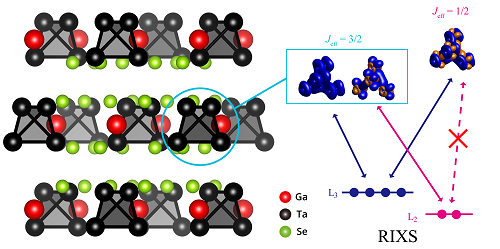research

(Professor Han (far right) and his research team)
A KAIST research team observed a new quantum mechanical magnetic state ‘Jeff = 3/2.’ This first observation of ‘Jeff=3/2’ could be the foundation for future research on superconductivity and quantum magnetism.
In quantum mechanics, total angular momentum is defined as the sum of spin and orbital angular momenta and is denoted with the ‘J.’ The newly identified magnetic moment can be described as a kind of angular momentum that occurs when specific conditions are met and has been denoted ‘Jeff’ with the meaning ‘effective angular momentum’ in the field. Jeff=3/2 has been a topic of discussion but was yet to be observed.
The research was co-led by Professor Myung Joon Han of the Department of Physics at Chung-Ang University in Korea, RIKEN in Japan, and the Argonne National Laboratory in the US. This research was published in Nature Communications on October 14, 2017.
In academia, spin-orbital coupling was known to lead to a unique quantum state and has been an active area of recent research. In contrast to magnetic moment by electron spin and orbital, the effective magnetic moment Jeff, formed from the coupling of the two, shows a unique ground state and interaction patterns, which could lead to new phenomena and properties.
Most studies in the last decade focused on ‘Jeff=1/2’, but there has not been any observation of ‘Jeff=3/2’, which led to slow progress. In 2014, the research team led by Prof. Han theoretically predicted the possibility of the ‘Jeff=3/2’ state in a certain type of materials based on molecular orbital, instead of atomic orbital. In the current study, the team applied the Selection Rule of quantum mechanics for the ‘Jeff=3/2’ state, which differs to the general spin moment, in order to experimentally detect this moment.
When electrons near the atomic nucleus are excited by X-rays, the excited electrons can be absorbed or re-emitted through interactions with other electrons. Here, the Selection Rule is applied to electrons. According to quantum mechanics, this rule is very unique in the ‘Jeff=3/2’ state and ‘Jeff=3/2’ is predicted to be distinguishable from general spin states. The prediction that was made using this idea was verified through the experiment using electrons extracted from tantalum at two different energy levels. In this material, the unique quantum mechanical interference by the ‘Jeff=3/2’ moment can be taken as direct evidence for its existence.
The new quantum state is very unique from any of the previously known magnetic states and this study could be the starting point for future research on the ‘Jeff=3/2’ moment. Further, this finding could contribute to future research on various properties of the magnetic states and its interactions.

(Figure 1: Crystal structure, MO levels, and RIXS process in GaTa4Se8.)

(Figure 2: Cluster model calculations of the L3 and L2 RIXS spectra)
-
research KAIST researcher Se Jin Park develops 'SpeechSSM,' opening up possibilities for a 24-hour AI voice assistant.
<(From Left)Prof. Yong Man Ro and Ph.D. candidate Sejin Park> Se Jin Park, a researcher from Professor Yong Man Ro’s team at KAIST, has announced 'SpeechSSM', a spoken language model capable of generating long-duration speech that sounds natural and remains consistent. An efficient processing technique based on linear sequence modeling overcomes the limitations of existing spoken language models, enabling high-quality speech generation without time constraints. It is expe
2025-07-04 -
event King Saud University and KAIST discussed Strategic AI Partnership
<From left> President Abdulla Al-Salman(King Saud University), President Kwang Hyung Lee(KAIST) KAIST (President Kwang Hyung Lee) and King Saud University (President Abdulla Al-Salman) held a meeting on July 3 at the KAIST Campus in Seoul and agreed to pursue strategic cooperation in AI and digital platform development. The global AI landscape is increasingly polarized between closed models developed by the U.S. and China’s nationally focused technology ecosystems. In this context
2025-07-04 -
research KAIST Uses AI to Discover Optimal New Material for Removing Radioactive Iodine Contamination
<(From the Right) Professor Ho Jin Ryu, Department of Nuclear and Quantum Engineering, Dr. Sujeong Lee, a graduate of the KAIST Department of Materials Science and Engineering, and Dr. Juhwan Noh of KRICT’s Digital Chemistry Research Center> Managing radioactive waste is one of the core challenges in the use of nuclear energy. In particular, radioactive iodine poses serious environmental and health risks due to its long half-life (15.7 million years in the case of I-129), hi
2025-07-03 -
research KAIST Enhances Immunotherapy for Difficult-to-Treat Brain Tumors with Gut Microbiota
< Photo 1.(From left) Prof. Heung Kyu Lee, Department of Biological Sciences, and Dr. Hyeon Cheol Kim> Advanced treatments, known as immunotherapies that activate T cells—our body's immune cells—to eliminate cancer cells, have shown limited efficacy as standalone therapies for glioblastoma, the most lethal form of brain tumor. This is due to their minimal response to glioblastoma and high resistance to treatment. Now, a KAIST research team has now demonstrated a new th
2025-07-02 -
event 2025 KAIST Global Entrepreneurship Summer School Concludes Successfully in Silicon Valley
< A group photo taken at the 2025 GESS Special Lecture.Vice President So Young Kim from the International Office, VC Jay Eum from GFT Ventures, Professor Byungchae Jin from the Impact MBA Program at the Business School, and Research Assistant Professor Sooa Lee from the Office of Global Initiative> The “2025 KAIST Global Entrepreneurship Summer School (2025 KAIST GESS),” organized by the Office of Global Initiative of the KAIST International Office (Vice President
2025-07-01